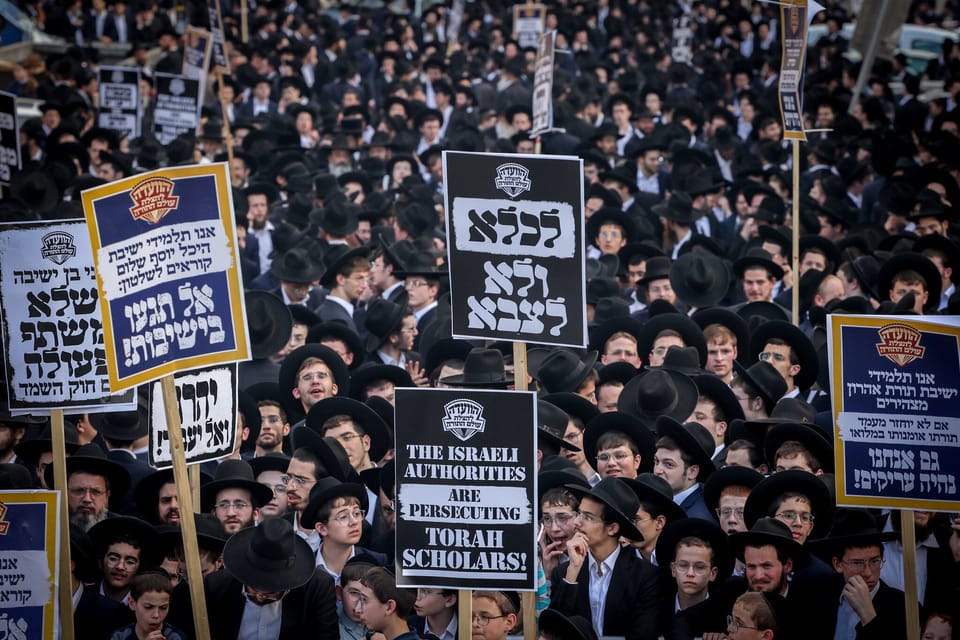Do Charedim believe in civil disobedience for Torah causes?

Yes — Charedim absolutely believe that when Torah is under threat, we have not only the right but sometimes the obligation to resist. And if that resistance requires nonviolent civil disobedience, then so be it.
But let’s be clear: This is not about politics. It’s not about culture wars. It’s not about "protest for the sake of protest." It’s about standing up for the eternal truth of the Torah when it is under attack — with full daas Torah guidance, respect for halachah, and clarity of purpose.
1. Halachic Basis for Civil Disobedience
Chazal teach us that:
"אין שלטון נוגע בחבירו כמלוא נימא" “No government has control beyond what Hashem permits” (Yoma 38b).
This reminds us that while governments may make decrees, Torah is supreme.
And we are commanded in the Torah:
"ולא תעשו ככל אשר אנחנו עושים פה היום, איש כל הישר בעיניו" “Do not do like we do here today — each man doing what is right in his own eyes” (Devarim 12:8).
Chazal interpret this to mean: Don’t create your own system of law. We are bound to Hashem’s laws — not man’s.
When a government — even a Jewish one — tries to override the authority of halacha, we are guided by a clear halachic principle:
“אם אומרים לך לעבור על דברי תורה – אל תשמע להם” “If they command you to violate Torah — do not obey” (Sanhedrin 49a).
This is echoed by the Rambam:
“If a king decrees something that goes against Torah — his decree is null and void.” — Rambam, Hilchos Melachim 3:9
This is not rebellion. This is fidelity to Torah.
2. Gedolim Who Led or Sanctioned Civil Disobedience
Rav Aharon Kotler zt”l was one of the strongest voices against compromises in religious education or army service. He taught that when the soul of Klal Yisrael is under threat, peaceful protest is a form of kiddush Hashem.
Rav Shach zt”l supported demonstrations — even large ones — when Torah was under threat. During the 1980s, when there were efforts to secularize parts of the education system, he called for mass tefillos and protests to awaken the conscience of the nation.
“When they attack the Torah, we must cry out! Not with hate, but with strength and clarity.” — Rav Elazar Menachem Man Shach, 1985 Rally
Rav Yosef Shalom Elyashiv zt”l permitted — and sometimes instructed — protests against secular court rulings that infringed on religious observance, such as autopsies, chilul Shabbos, and coercive government education.
“The only law that binds us is Hashem’s law. We must make our voices heard when that is forgotten.” — Rav Elyashiv, cited in Mishpacha magazine, 2004
Rebbe Yoel Teitelbaum zt”l (Satmar Rebbe) went even further and held public protests in America against Zionism, viewing it as a betrayal of Torah. While most Charedi Gedolim did not go that far, his approach reflected a strong belief in protest as spiritual resistance.
Chacham Ovadia Yosef zt”l protested against the Supreme Court’s attempt to redefine Jewish identity and ruled it was a chov kadosh — a sacred obligation — to publicly resist attempts to secularize Israel’s legal framework.
3. Limits and Conditions
Not all protests are justified.
The Torah forbids violence, vandalism, or disgracing chilul Hashem. Even when we protest, we are ambassadors of Hashem’s name. That’s why Gedolim must guide every step. No one acts independently.
The Chazon Ish warned against "zeal without wisdom," saying:
“When passion is not tempered by halacha and daas Torah, it leads to destruction.”
When a protest will lead to desecration of Hashem’s name, or strengthen hatred against Torah Jews, it must be avoided or rethought.
4. Modern Examples
- Autopsies (1950s–70s): Charedi protests prevented mass autopsies in hospitals, leading to the eventual passage of stricter laws respecting the dignity of the dead.
- Shabbos in Yerushalayim: Peaceful demonstrations helped preserve Shabbos in many public spheres, including closure of roads and shops in religious neighborhoods.
- Draft Resistance: Peaceful rallies against mandatory army service for yeshiva bochurim, especially in 2013–2017 and in 2025, brought tens of thousands to the streets in tefillah and protest, with Gedolim urging tefillos, not stones.
- Supreme Court Decisions: Protests were held in response to court attempts to enforce non-religious curricula or coerce religious schools.
In Summary
Yes — Charedim believe in civil disobedience when Torah is being threatened. But it is never about anger. It is never about power. It is always about kavod haTorah and doing what Hashem wants.
Our loyalty is not to regimes or movements — but to the Ribbono Shel Olam.
And when we rise up, it must be with humility, clarity, daas Torah, and a broken heart — not a raised fist.
Sources and Footnotes
- Yoma 38b – “No government has control unless Heaven decrees.”
- Devarim 12:8 – “Do not do what is right in your eyes.”
- Sanhedrin 49a – Disobey commands that contradict Torah.
- Rambam, Hilchos Melachim 3:9 – A king’s command cannot override Torah.
- Igros Moshe, Yoreh Deah 1:158 – Rav Moshe Feinstein discusses the Torah obligation to protest when Hashem’s honor is desecrated.
- Rav Shach, speeches collected in Michtavim u’Maamarim, Vol. 3
- Rav Elyashiv, Mishpacha Magazine Interview, 2004
- Chazon Ish, Emunah u’Bitachon 3 – Zeal must be directed by Torah.
